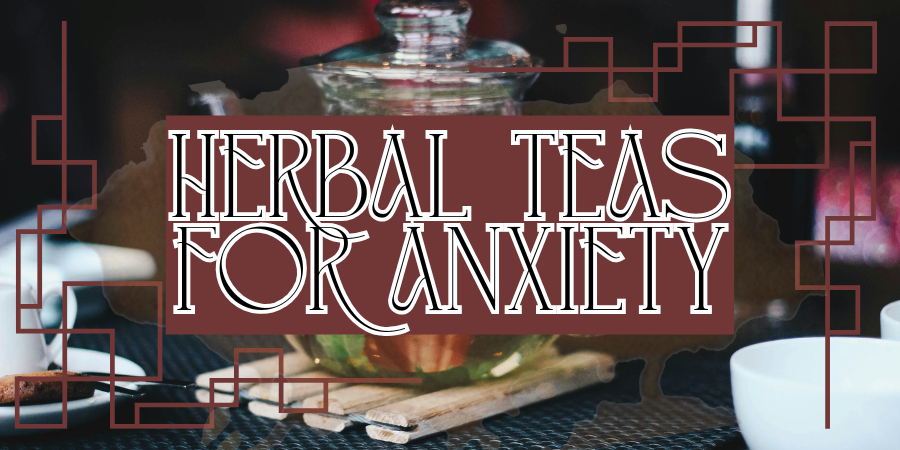Anxiety affects millions of people worldwide, and while medications and therapy are effective treatments, many turn to natural remedies for additional support. Herbal teas have become one of the most soothing and accessible options. From calming chamomile to refreshing peppermint, the ritual of brewing tea can be just as healing as the compounds inside the cup. In this guide, we’ll explore the best herbal teas for anxiety, compare their benefits, and help you find the perfect cup to calm your mind.

Understanding Anxiety and Natural Remedies
What Causes Anxiety?
Anxiety can arise from stress, hormonal imbalances, or lifestyle factors like poor sleep, excessive caffeine, and high-pressure environments. It manifests as restlessness, racing thoughts, and physical tension.
The Role of Herbal Medicine in Stress Management
For centuries, herbal medicine has been used to calm the nervous system. Many herbs found in teas contain natural compounds that reduce stress hormones, ease muscle tension, and promote relaxation without the harsh side effects of pharmaceuticals.
How Herbal Teas Help with Anxiety
Relaxing Compounds Found in Herbal Teas
- L-Theanine (green tea): Promotes calm alertness
- Apigenin (chamomile): Binds to brain receptors that ease anxiety
- Menthol (peppermint): Relaxes muscles and supports digestion
- Linalool (lavender): Has sedative and calming effects
The Science Behind Herbal Tea and Stress Reduction
Studies show herbal teas can lower cortisol (the stress hormone), improve heart rate variability, and promote sleep—making them a gentle yet effective part of anxiety management.
The Best Herbal Teas for Anxiety Relief
Chamomile Tea: Nature’s Gentle Soother
Chamomile is often the first tea people try for anxiety. Its calming apigenin content reduces stress and promotes sleep. Chamomile tea has a mild, floral flavor that’s best enjoyed before bed.
Green Tea (L-Theanine): A Balanced Energy Calm
Green tea contains caffeine but also L-theanine, which balances stimulation with relaxation. It’s ideal for people who want focus without jitters.
Peppermint Tea: Refreshing Stress Relief
Peppermint tea is caffeine-free, refreshing, and helps relax tense muscles. Its cooling menthol effect soothes both mind and body.
Lavender Tea: Aromatherapy in a Cup
Lavender is famous for its relaxing scent. Drinking Lavender tea can help reduce nervous tension and promote restful sleep.
Lemon Balm Tea: Mood-Lifting Benefits
Lemon balm has been shown to reduce restlessness and support positive mood. It’s often recommended for mild to moderate anxiety.
Passionflower Tea: For Restlessness and Nervousness
Passionflower boosts GABA levels in the brain, helping reduce racing thoughts and restlessness. It’s great for evening relaxation.
Valerian Root Tea: Calming Sleep Support
Valerian is best known as a natural sleep aid. For those whose anxiety disrupts sleep, valerian root tea may be the solution.
Side-by-Side Comparison of Herbal Teas for Anxiety
| Tea | Best For | Flavor Profile | Best Time to Drink |
|---|---|---|---|
| Chamomile | Sleep, mild anxiety | Floral, sweet | Evening |
| Green Tea | Daytime focus | Earthy, grassy | Morning/Afternoon |
| Peppermint | Tension, digestion | Cool, minty | Anytime |
| Lavender | Sleep, relaxation | Floral, fragrant | Evening |
| Lemon Balm | Mood boost | Citrusy, fresh | Afternoon/Evening |
| Passionflower | Nervous thoughts | Earthy, bitter | Evening |
| Valerian Root | Severe stress, insomnia | Pungent, earthy | Night |
How to Choose the Right Herbal Tea for Your Needs
For Daytime Calm and Focus
Choose green tea or lemon balm tea for gentle stress relief without drowsiness.
For Nighttime Relaxation and Sleep
Chamomile, lavender, passionflower, or valerian root are excellent bedtime choices.
For Reducing Physical Tension
Peppermint tea works well for body relaxation and digestive discomfort linked to stress.
Tips for Brewing Herbal Tea for Maximum Effect
Water Temperature and Steeping Time
- Chamomile, lavender, and lemon balm: 5–7 minutes in hot water
- Green tea: 2–3 minutes at lower temperature (to avoid bitterness)
- Valerian root: 10 minutes for stronger effect
Enhancing Flavor Without Reducing Benefits
- Add a slice of lemon for vitamin C boost
- Sweeten lightly with honey for added calming effect
- Blend teas (e.g., chamomile + lavender) for layered relaxation
Potential Risks and Side Effects of Herbal Teas
Interactions with Medications
- Chamomile may interact with blood thinners
- Valerian should not be mixed with sedatives
- Passionflower may enhance drowsiness when combined with medication
Who Should Avoid Certain Herbal Teas?
- Pregnant women should avoid valerian and passionflower
- People sensitive to caffeine should limit green tea
Expert Opinions and Research on Herbal Teas for Anxiety
Clinical studies have found chamomile to be effective in reducing moderate anxiety symptoms, while L-theanine in green tea shows promise in balancing stress without sedation. Herbal teas are not a replacement for medical treatment but can complement therapy and lifestyle changes.
FAQs on Herbal Teas for Anxiety
1. How many cups of herbal tea should I drink per day for anxiety?
Most experts recommend 2–3 cups daily for noticeable benefits.
2. Can herbal tea replace anxiety medication?
No—while helpful, herbal teas should be used as a complementary therapy, not a replacement for prescribed medication.
3. Which tea works the fastest for anxiety relief?
Chamomile and peppermint tea often bring the quickest sense of calm.
4. Can herbal teas cause drowsiness?
Yes—especially valerian, chamomile, and passionflower, which may induce sleepiness.
5. Are herbal teas safe during pregnancy?
Stick to chamomile and peppermint in moderation. Avoid valerian, passionflower, and strong herbal blends.
6. Is caffeine-free tea better for anxiety?
Yes—caffeine can sometimes worsen anxiety, so caffeine-free teas are usually safer.
Conclusion: Finding Calm in Every Cup
Herbal teas provide a gentle, natural way to manage anxiety. From the soothing effects of chamomile to the refreshing calm of peppermint, there’s a tea for every mood and time of day. While they aren’t a substitute for professional treatment, they can complement a healthy lifestyle and bring comfort in stressful moments. With the right choice, every sip can bring you one step closer to peace.
🔗 External Resource: National Center for Complementary and Integrative Health – Herbs at a Glance
read more:
- Herbal vs. CBD Teas: Natural Ways to Ease Anxiety
- Why Tea Rituals Help Reduce Stress and Anxiety
- Valerian Root Tea for Sleep: Natural Stress Relief
- Can Herbal Teas Replace Anxiety Meds? Science Explains
- Tea for anxiety
- best tea for sleep
- milk thistle tea
- chai vs coffee
- pakistani tea
